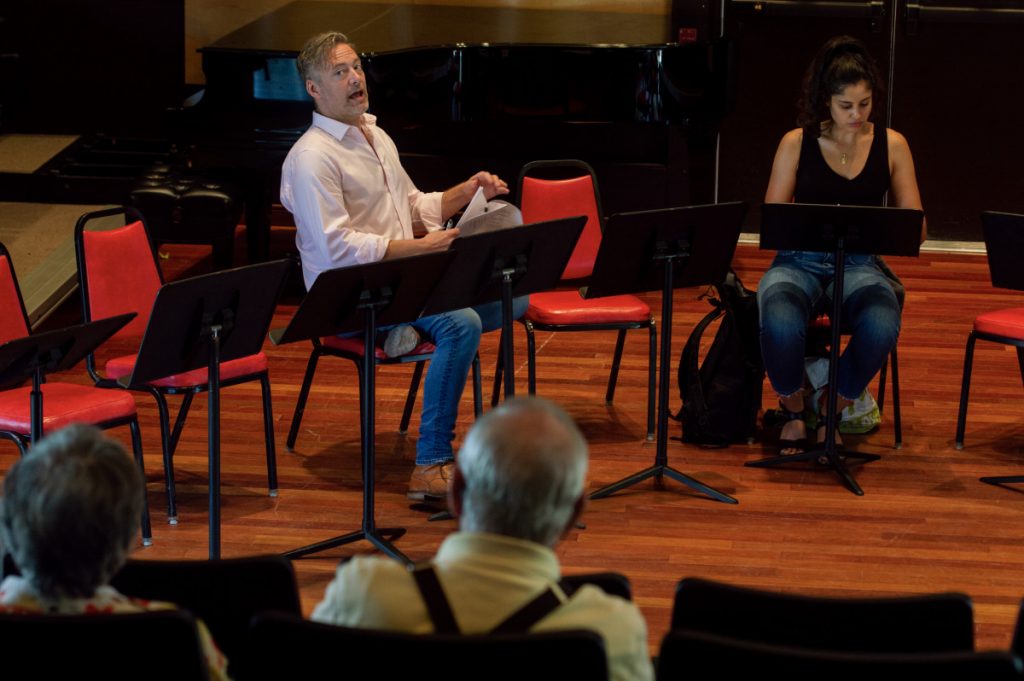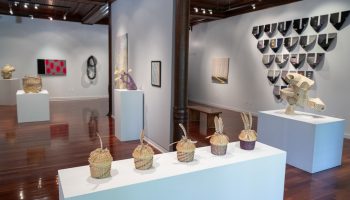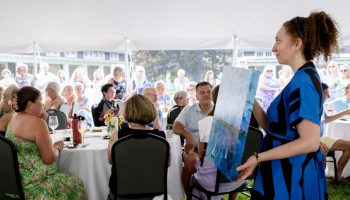
Stacey Federoff
copy desk chief
To tell the story of Chautauqua through opera, librettist Jerre Dye recalled sharing coffee with a longtime Chautauquan, eavesdropping on park benches and poring over the archives.
“Chatauqua is a place full of stories,” he said. “One only has but to listen.”
Now, those stories are taking shape as part of The Summer Place, a new opera co-commissioned by Chautauqua Opera Company and Opera Memphis with generous support of the Chautauqua Opera Guild. Two parts, A.E. Reverie and Love, Loss and the Century Upon Us, are set to be performed from 3:30 to 4:30 p.m. today in Fletcher Music Hall. The full piece, featuring five total parts and transitions in between, will premiere next year to celebrate the sesquicentennial of the Institution.
Dye began working on the idea in 2016 with Steven Osgood, general and artistic director of the Chautauqua Opera Company. The pair then brought on board composers Kamala Sankaram and Rene Orth, and dramaturg Ned Canty, all of whom will be a part of today’s reading.
Orth said she had been wanting to work with Dye for several years, while Sankaram worked with Osgood for last summer’s production of Thumbprint.
“One of the really lovely things about these pieces is that they have themes that are universal, which I know is the point of the conversations that take place at the Institution anyway,” Sankaram said.
She composed the music for A.E. Reverie, set in 1929, featuring a young woman on an “emotional journey” after seeing Amelia Earhart touch down at Chautauqua.
“It inspires an opening up of her worldview in many different ways,” Sankaram said.
Love, Loss and the Century Upon Us, composed by Orth, focuses on a young couple in 1899 who are on a date while seeing the electric lights on the grounds, which was a noteworthy event in the age of Thomas Edison’s new invention.
The couple have opposing views of technology, Canty said, calling the piece a short romantic comedy.
“It’s a rarity (in opera), but it’s lovely, and that is part of the goal is showing the full complexity of Chautauqua,” he said.
Both pieces connect through longing, wanting and looking toward the future, Dye said. In 2024, The Summer Place will feature several site-specific performances on the grounds of the Institution. Showcasing a preview of the piece in these immersive settings, the two-part reading will be performed again at 7:15 to 7:45 p.m. July 18 outside the Athenaeum Hotel.
The reading comes just after a community meeting Monday to address the way forward for the Chautauqua Opera Company and Conversatory, which addressed the “renewed vision” for the program next year and in 2025 due to budget concerns. Under consideration in the future, as announced July 4, Chautauqua Opera may shift focus exclusively as an incubator for new works such as The Summer Place. Osgood said at the meeting that 2024 may be a “transitional year” that will bring this piece and other chamber operas to production.
In the new work of The Summer Place, the “chapters” of the full story remain more open-ended than many traditional operas, inviting the viewer to “think about the future of these people that you’re seeing,” Canty said.
Sankaram said telling these stories through opera enables music to become a “direct window” in to what it feels like to visit Chautauqua, even if they’ve never been here before.
“… (They) will still have an understanding of what (Chautauqua) is and the kinds of emotions that (Chautauqua) creates in people,” she said. “… That’s what opera does.”
While honoring the Institution’s milestone with performances here next year is where the opera will start, Dye said the hope of everyone involved is that the piece is performed to wider audiences — much like the idea of “Chautauqua” as a incubator for education, curiosity and imagination that spread long ago.
“Chautauqua fits in to the fabric of America in such a strange and wonderful way,” he said. “I’m happy to be an evangelist for that.”




